Two Miserable Presidents (23 page)
Read Two Miserable Presidents Online
Authors: Steve Sheinkin

After her husband's death,
Varina Davis
shocked her Southern friends by moving to New York City and supporting herself by writing newspaper articles. One day there was a knock on Varina's hotel room door. She opened the door and the woman in the doorway said:
Varina Davis
shocked her Southern friends by moving to New York City and supporting herself by writing newspaper articles. One day there was a knock on Varina's hotel room door. She opened the door and the woman in the doorway said:
“Hello, I am Mrs. Grant.”
“I am very glad to meet you,” Varina said to Julia Grant. “Come in.”
Varina Davis and Julia Grant became close friends and were often seen around town together. Both women hoped their visible friendship would help heal the deep wounds left by the Civil War. Varina lived well into the twentieth centuryâshe even rode in a car in 1906 (she didn't like it). She died in New York, but was buried beside her husband in Richmond.
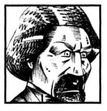
After the war
Frederick Douglass
continued his nonstop travels, speaking and writing in defense of the rights of African Americans. While traveling in Maryland in 1877, Douglass was surprised to get a note from Thomas Auld, the man who had owned him nearly forty years before.
Auld was dying and wanted to see Douglass one last time. Douglass entered the house and stepped up to Auld's bedside. Auld reached out a trembling hand, and Douglass took it in his own. Then Auld began to weep. Douglass sat down and the two men talked over old times. Then Douglass got back to work. “Forty years of my life have been given to the cause of my people,” he wrote in his autobiography. “And if I had forty years more they should all be sacredly given to the great cause.”
Frederick Douglass
continued his nonstop travels, speaking and writing in defense of the rights of African Americans. While traveling in Maryland in 1877, Douglass was surprised to get a note from Thomas Auld, the man who had owned him nearly forty years before.
Auld was dying and wanted to see Douglass one last time. Douglass entered the house and stepped up to Auld's bedside. Auld reached out a trembling hand, and Douglass took it in his own. Then Auld began to weep. Douglass sat down and the two men talked over old times. Then Douglass got back to work. “Forty years of my life have been given to the cause of my people,” he wrote in his autobiography. “And if I had forty years more they should all be sacredly given to the great cause.”
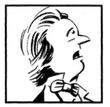
After losing the presidential election of 1860 to Abraham Lincoln,
Stephen “the Little Giant” Douglas
truly acted like a giant. Putting aside his bitter rivalry with Lincoln, Douglas promised to do everything in his power to help the new president save the Union. As the two men shook hands, tears came to Lincoln's eyes and he said, “God bless you, Douglas.” Douglas used every ounce of energy in his body trying to persuade Southerners to give President Lincoln a chance. Weakened, exhausted, and disappointed, he died of a fever in June 1861, two months after the war began.
Stephen “the Little Giant” Douglas
truly acted like a giant. Putting aside his bitter rivalry with Lincoln, Douglas promised to do everything in his power to help the new president save the Union. As the two men shook hands, tears came to Lincoln's eyes and he said, “God bless you, Douglas.” Douglas used every ounce of energy in his body trying to persuade Southerners to give President Lincoln a chance. Weakened, exhausted, and disappointed, he died of a fever in June 1861, two months after the war began.
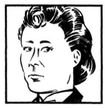
Sarah Emma Edmonds,
or “Frank Thompson” as she was known to her fellow Union soldiers, served in the Union army as a nurse and spyâand her secret identity was never discovered. She volunteered for several dangerous spying missions, sneaking behind enemy lines disguised as characters including an escaped slave and an overweight Irish peddler named “Bridget O'Shea.” Edmonds married after the war and had three sons. “I am naturally fond of adventure,” she said. “But patriotism was the true secret of my success.”
or “Frank Thompson” as she was known to her fellow Union soldiers, served in the Union army as a nurse and spyâand her secret identity was never discovered. She volunteered for several dangerous spying missions, sneaking behind enemy lines disguised as characters including an escaped slave and an overweight Irish peddler named “Bridget O'Shea.” Edmonds married after the war and had three sons. “I am naturally fond of adventure,” she said. “But patriotism was the true secret of my success.”
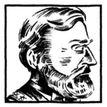
Ulysses S. Grant
always regretted not going to the play with Lincoln that famous night. Had he been there, he wondered, would he have heard Booth opening the door to Lincoln's box? Could he have grabbed Booth before the killer had a chance to pull the trigger?
always regretted not going to the play with Lincoln that famous night. Had he been there, he wondered, would he have heard Booth opening the door to Lincoln's box? Could he have grabbed Booth before the killer had a chance to pull the trigger?
Just forty-three years old when the war ended, Grant decided to start a new career in politics. And he got off to a good start, winning the presidential election of 1868. But it turned out he was a much better soldier than politician. He had the embarrassing habit of giving key government jobs to old army friends who were completely unqualified.
After two terms in the White House, Ulysses and Julia Grant moved to New York City, where Ulysses immediately lost all their money in bad investments. Then his doctor told him he had throat cancer and had only a few months to live. Displaying his famously fierce determination, Grant raced against death to finish an autobiography, which he hoped would earn some money for his family. Wrapped in blankets, suffering from soaring fevers and piercing pain, Grant finished the book just days before he died.
The Personal Memoirs of U.S. Grant
was a huge success. Later that year the publishers handed Julia Grant a check for $200,000.
The Personal Memoirs of U.S. Grant
was a huge success. Later that year the publishers handed Julia Grant a check for $200,000.
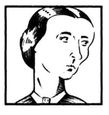
“Wild Rose” O'Neal Greenhow
spied for the Confederacy until Union police kicked her out of Washington, D.C., in 1862. Next, at Jefferson Davis's request, she traveled to Europe and tried to persuade big shots there to support the South. Sailing back to the Confederacy in 1864, her ship was chased by a Union gunboat and slammed into a sandbar off the coast of North Carolina. Determined to avoid capture, Greenhow jumped onto a lifeboat and rowed toward land. The boat tipped over in a storm and she drowned.
spied for the Confederacy until Union police kicked her out of Washington, D.C., in 1862. Next, at Jefferson Davis's request, she traveled to Europe and tried to persuade big shots there to support the South. Sailing back to the Confederacy in 1864, her ship was chased by a Union gunboat and slammed into a sandbar off the coast of North Carolina. Determined to avoid capture, Greenhow jumped onto a lifeboat and rowed toward land. The boat tipped over in a storm and she drowned.
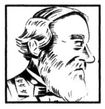
Exhausted and broke after the war,
Robert E. Lee
took the job of president of Washington College in Virginia (now Washington and Lee University). Lee needed the income, but he also wanted to set an example for his fellow Southerners; he urged them to put the war behind them and help prepare the country for a better future. “We wish now for good feeling to grow up between North and South,” he said.
Robert E. Lee
took the job of president of Washington College in Virginia (now Washington and Lee University). Lee needed the income, but he also wanted to set an example for his fellow Southerners; he urged them to put the war behind them and help prepare the country for a better future. “We wish now for good feeling to grow up between North and South,” he said.
Lee's health never fully recovered from four years of war, and his body weakened quickly in the fall of 1870. One afternoon as Lee was leaving his office, a student showed up with Lee's picture, hoping the general would sign it for a girl he knew back home. But Lee looked very tired,.so the student said he'd come back some other time. “No,” Lee said, “I will go right back and do it now.” It was the last time Lee signed his name. He died at home two weeks later.
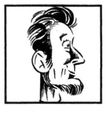
“There was a cheerless cold rain and everything seemed gloomy.” That's how the secretary of the navy, Gideon Welles, described the morning of April 15, the morning
Abraham Lincoln
died. Welles watched Lincoln breathe his last breath, then walked to the White House, where he saw hundreds of African American women and children standing in front of the building, crying in the rain.
Abraham Lincoln
died. Welles watched Lincoln breathe his last breath, then walked to the White House, where he saw hundreds of African American women and children standing in front of the building, crying in the rain.
The shocking news of Lincoln's death spread across the nation that morning.
People in Philadelphia read the news on their way to work, and the city's streetcars were soon filled with weeping men. In Boston a thousand people started marching together through the streetânot knowing why, just silently marching. Church bells tolled all over the North, and colorful flags celebrating the Union victory were taken
down. Teachers told their students to go home, there would be no school that day.
down. Teachers told their students to go home, there would be no school that day.
White Southerners were stunned too, for a different reason. Mary Chesnut spoke for many when she said, “I know this foul murder will bring upon us worse miseries.” She may not have liked Lincoln, but she feared that without his strong leadership and sense of justice, the process of Reconstruction was going to be much harder on the South. She was right.
Lincoln's body, meanwhile, was taken by train from Washington to Springfield, Illinoisâthe same route Lincoln had taken from Springfield to Washington just over four years before. After facing fierce criticism every day of his presidency, Lincoln would probably be amazed to find out that these days historians usually rank him as the greatest president in American history.
Other books
Santa Reads Romance by Dara Joy
John Aubrey: My Own Life by Ruth Scurr
Loving Jiro by Jordyn Tracey
I Can Get It for You Wholesale by Jerome Weidman
Running Home to You (The Running Series) by Sweeney, Suzanne
I Know Where the Bodies Are Buried by Clarke, Oliver
Redemption of Fate (Fate Series Book 2) by S. Simone Chavous
What Looks Like Crazy on an Ordinary Day by Pearl Cleage
We That Are Left by Clare Clark